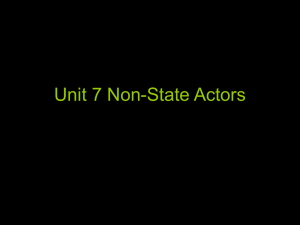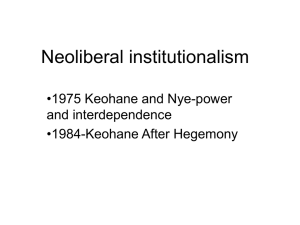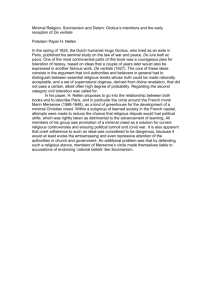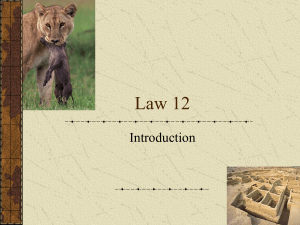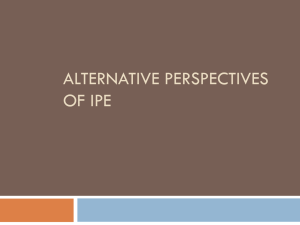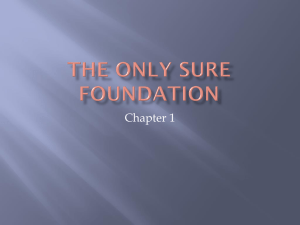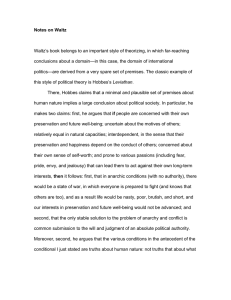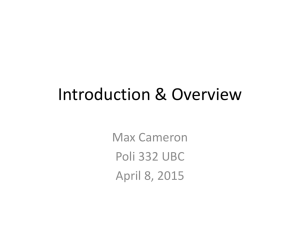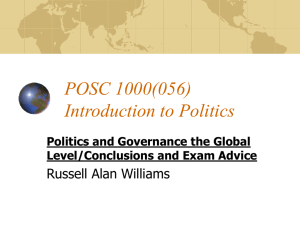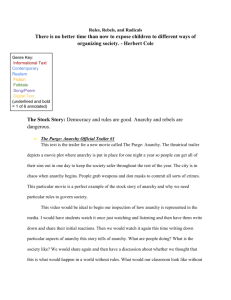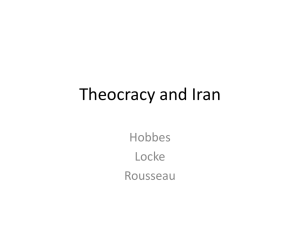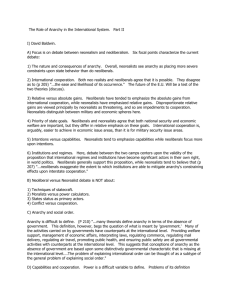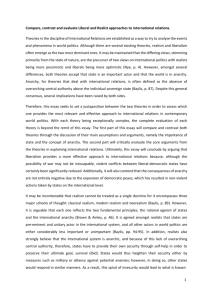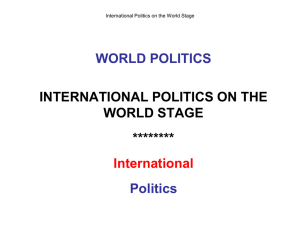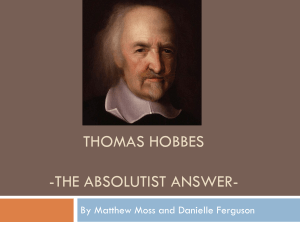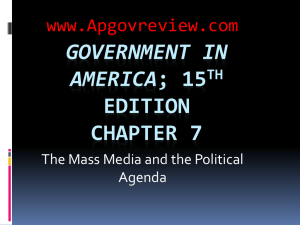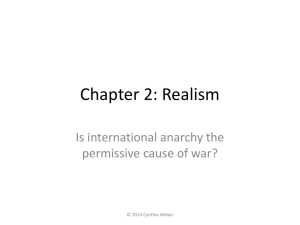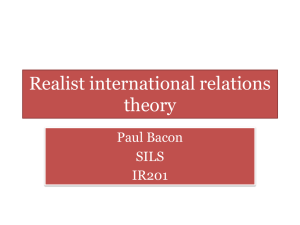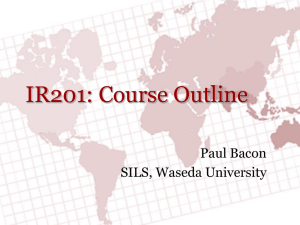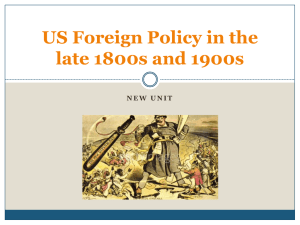Key Figures in the History of Realism
advertisement
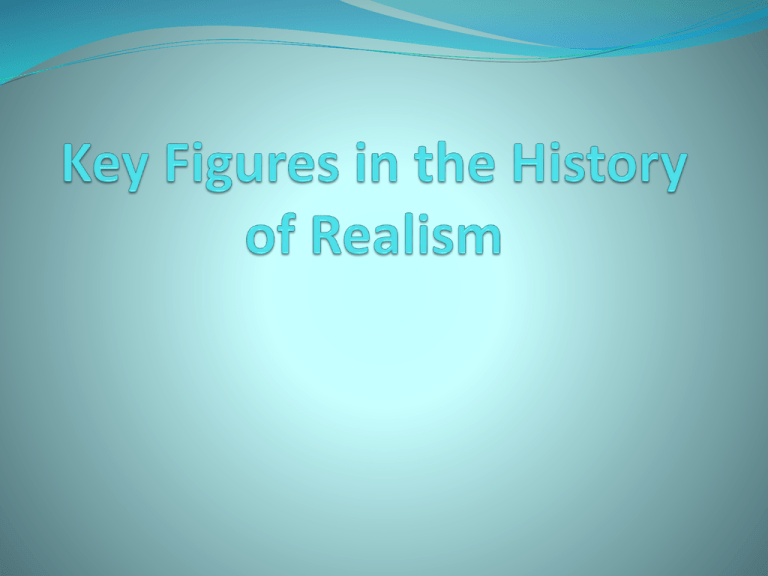
Thucydides Often called father of realism 5th century B.C. Historian seeking to understand the nature of war and why it continually recurs Argued that war between Sparta and Athens (Peloponnesian War) war inevitable Emphasis on “power” and “competing alliances” “What made war inevitable was the growth of Athens’ power and the fear which this caused in Sparta” Machiavelli 1469-1527 Analyzed interstate relations in the Italian system of the 16th century; famous work “The Prince” Emphasis on power, formation of alliances, causes of conflict between different city-states National security-survival of the state-was paramount Politics must be separated from morality Stressed “how the world is” (empirical approach) rather than how the world should be (normative approach) Hobbes 1588-1679 Wrote the Leviathan in the 17th century Focus was domestic politics yet Hobbes contributed to the concept of “anarchy” in the international system of states His objective was to make the strongest case possible for a powerful, centralized political authority “men” are solitary beasts and egotistical Man’s primary motivation is survival (self-preservation) which results in a war of all against all in the state of nature (parallel to the international system of anarchy) Hugo Grotius Often cited as father of international law A contemporary of Hobbes (Grotius 1583-1645) Grotius recognized the essential anarchy of international relations by calling for the establishment and recognition of laws or rules by states as binding Stressed values and norms—particularly when recognized as international law or rules by states—as vehicle in maintaining order under anarchy To Grotians, order in the international system is a combination of power and collective values (international law) De Jure Belli ac Pacis (1625) Grotius wrote the book “One the Law of War and Peace” Places international law on a secular basis and made the daring assertion that law between states was based on reason (not theology) Listed 4 Causes that made war “just” 1. self-defense 2. To enforce rights 3. To seek reparation for injury 4. To punish a wrong-doer Carl von Clausewitz Prussian general, war theorists and historian 1780-1831 “War is the continuation of politics by other means.” Legitimacy of war: war is diplomacy by other means; it must always serve a political purpose Aim of war always the same: to destroy or substantially weaken an enemies warfighting/warmaking capabilities importance of "moral forces" (more than simply "morale") as opposed to quantifiable physical elements E=C x W (E=battlefield effectiveness; C=military capabilities; W=moral factor (will to use capability to its fullest) War is inherently “foggy” and “unpredictable” The West's modern perception of war is based on the Clausewitzian principles taught in On War. Its military doctrine, organization, and norms are all based on Clausewitzian premises, even to this day. Diplomatic History Dominant in early development of international relations as a systematic field of study Late 19th, early 20th centuries Questions Pondered a. Who did what to whom b. Issues of time and place c. Approach largely descriptive rather than analytical Strategic and Geopolitical Analysis Geopolitics: approach to international relations which seeks to explain and predict the political behavior of states primarily in terms of geographic variables. Central focus: a state’s absolute and relative distribution of political and military power Questions pondered: What are the consequences for a state’s national interest? Relative power? Absolute power? Geo-economics: approach to international relations which seeks to explain and predict the political behavior of states primarily in terms of its geographic and economic characteristics (such as levels and location of production, trade, distribution, consumption of goods and services). Central focus: a state’s absolute and relative distribution of wealth Mahan and Mackinder Alfred Mahan (US admiral): 1890 “Naval power was central toward a state’s economic and political power” World’s oceans are its highways; control of these highways is instrumental in controlling the course of international relations Halford Mackinder (1919): emphasized intimate relationship between geography and technology 20th century gave land power the dominant position Eurasia: whichever country dominated the Eurasian landmass would inevitably dominate world politics Heartland versus Rimland Socioeconomic Theories of IR Marxist-Leninist: conflict is not the result of anarchy and the security dilemma, but rather the result of capitalist states competing economically against one another Lenin (1912): Imperialism—The Highest Stage of Capitalism World War I result of capitalism and colonialism Imperialism: refers to the relationship of a hegemonic state to subordinate states, nations, and people under its control Colonialism: variety of imperialism; involves the settlement of foreign territories; maintenance of rule over a subordinate population
